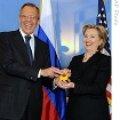Clinton and Lavrov were in a cheerful mood as they began their joint news conference here in Geneva. They clearly seemed to have warmed to each other after what they called a wonderful meal together and said they were hopeful this first meeting would lead to future significant U.S.-Russia discussions.
Clinton said the two countries shared a number of common interests. She said they promised to work constructively in areas of mutual interest such as arms control, nuclear non-proliferation, Afghanistan, Iran and North Korea.
"There is no time to waste on a number of these significant challenges, so we will begin working immediately to translate our words into deeds. In particular, we discussed at some length our top priorities, including the negotiation of a follow-on agreement of a START (Strategic Arms Reduction Treaty) treaty and broader areas of cooperation to reduce the number of nuclear weapons and prevent further proliferation," she said. The first U.S.-Russia START treaty signed in 1991 placed a limit of 6,000 strategic or long-range nuclear warheads on each side. A second treaty signed in 2002 called for further deep cuts in each country's nuclear arsenals. That treaty expires at the end of this year.
Lavrov agreed with Clinton's position that it was important to get to work immediately on negotiating a new treaty. He spoke through an interpreter. "We will do everything to have this agreement reached. This treaty, present treaty has become obsolete. The limits in it have been implemented long ago and staying within the boundaries of that treaty would mean that the United States will have to increase these offensive strategic weapons, sending a very bad signal to the rest of the world, especially during the preparation for the review conference of the NPT (non-proliferation treaty) conference," he said. That conference is scheduled to take place in 2010. Both ministers said they believe they will conclude a new START treaty by the end of this year.
While Clinton and Lavrov spoke about their areas of common interest, they also acknowledged areas of differences, including the war in Georgia over the breakaway region of South Ossetia and ways of dealing with Iran's nuclear program. By Lisa Schlein Geneva 06 March 2009

